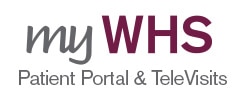COVID-19 &
the Emergency Department
When to Go to the Hospital
In the age of COVID, deciding when to seek treatment and where to seek treatment can be a challenge. Some people may even find themselves afraid to go to a hospital, an outpatient center or a physician’s office, even when it’s necessary. Let us help you stay healthy and find the care that is right for you.
Seeking care can range from in person or virtual appointments with your primary care physician, going to an urgent care or even emergency department (ED) when appropriate. But how do you know when it is appropriate to seek care at each of these facilities? The best place to start is to know the symptoms of a medical emergency. Also, when it comes to COVID, understanding what types of services are available for patients with COVID symptoms in an Emergency Department and how to recognize serious COVID symptoms could save you money and a trip to the emergency room.
When should I go to the Emergency Department (ED)?
Getting emergent help when needed is especially important for issues like strokes and heart attacks. Outcomes for these medical emergencies are tied to how quickly the patient receives care. That’s why it’s so important to seek treatment at the Emergency Department when you are showing signs or symptoms of a medical emergency. Minimizing non-emergent visits to the ED can save you time, and unnecessary co-pay(s), and can help hospitals ensure expedient treatment for those most in need of emergency care.
Symptoms of a Medical Emergency
Some of the symptoms that may indicate a life-threatening emergency include:
- Uncontrolled bleeding
- Chest pain or heart attack symptoms
- Upper abdominal pain or pressure
- Fainting, sudden dizziness or weakness
- Changes in vision
- Difficulty speaking or slurred speech
- Confusion or changes in mental status
- Difficulty breathing, shortness of breath
- Any severe pain
- Severe or persistent vomiting or diarrhea
- Severe Coughing or vomiting blood
When should I go to the Hospital for COVID?
First, review your symptoms before deciding if you need urgent/emergent care or just a follow up with your primary care provider.
If you had a positive COVID test and have mild to moderate symptoms, this does not necessarily mean you need to go to an emergency department. Most people who have COVID and experience mild to moderate symptoms can fully recover from home. However, some people may experience more serious symptoms of COVID that do require treatment at a hospital, particularly those who have underlying conditions.
Examples of these serious symptoms include:
- Trouble breathing or catching your breath
- Lips and/or face turning blue
- Persistent pain or pressure in the chest
- New confusion or can’t be woken up
Seek emergent medical care if this is the case.
If you have other questions about your COVID symptoms, call your doctor’s office.
Can I go to the Emergency Department for a COVID Test or Treatment?
If you are only seeking a COVID test and show no other signs of emergency care, then this is not the testing location for you. If you have mild to moderate COVID symptoms or are asymptomatic and would like to be tested for COVID, please contact your primary care provider to discuss your testing options. You can also use this website to find tests near you hhs.gov/coronavirus/community-based-testing-sites/index.html or by simply searching COVID Tests near me on your search engine.
Testing for COVID in one of our WHS Emergency Departments is reserved for ED patients with serious symptoms, patients that are to be admitted into the hospital or others as determined by the ED staff.
Monoclonal antibody treatment, an infusion therapy that treats mild to moderate COVID, is available at WHS but not through our WHS Emergency Departments. To learn more about this treatment, contact your doctor’s office.
When should I choose an Urgent Care for my symptoms?
Urgent care centers can offer immediate care for many conditions. Some can even offer telemedicine. Common conditions treated at urgent care centers include:
- Cold and flu symptoms
- Cuts requiring stitches
- Insect bite
- Mild fevers
- Minor burns
- Pink eye
- Rashes
- Sprains and strains
Before you go, call or check the website of the urgent care you’ve chosen for updates to hours or the services they provide.
When should I just follow up with my doctor’s office?
It’s important to follow up with your doctor for your yearly exam and in-between, as needed. It is important for you to treat your health problems early because sometimes irreversible damage can occur when you delay care. They can even help you with COVID, flu or other illnesses. Depending on the situation, your primary care doctor may provide you with an in-person visit or a telehealth evaluation. If you are in need of a primary care provider – click here to make an appointment with one today.
Staying Safe During Coronavirus
Hospitals across the nation are facing challenges due to the pandemic. Despite this, hospitals are still safe places to come to for care. There are a number of measures that WHS has in place to keep you safe. Click here to see our safe care commitment to you and our community.
Disclaimer
THIS WEBSITE DOES NOT PROVIDE MEDICAL ADVICE
The information, including but not limited to, text, graphics, images and other material contained on this website are for informational purposes only. No material on this site is intended to be a substitute for professional medical advice, diagnosis or treatment. Always seek the advice of your physician or other qualified health care provider with any questions you may have regarding a medical condition or treatment and never disregard professional medical advice or delay in seeking it because of something you have read on this website.


